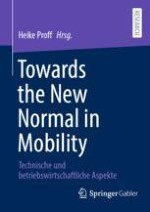2023 | OriginalPaper | Buchkapitel
Transformationsprozesse: Akzeptanz der Elektrifizierung von Unternehmensflotten
verfasst von : Carina Büttner
Erschienen in: Towards the New Normal in Mobility
Verlag: Springer Fachmedien Wiesbaden
Aktivieren Sie unsere intelligente Suche, um passende Fachinhalte oder Patente zu finden.
Wählen Sie Textabschnitte aus um mit Künstlicher Intelligenz passenden Patente zu finden. powered by
Markieren Sie Textabschnitte, um KI-gestützt weitere passende Inhalte zu finden. powered by
